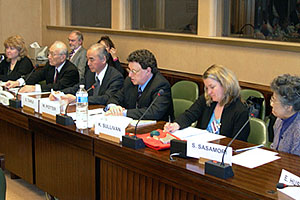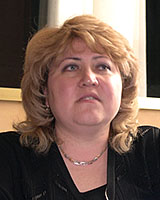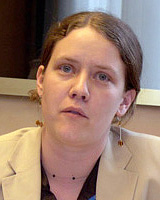May 22, 2008

Seminar panelists
Since November 2002, when the United Nations General Assembly endorsed the Secretary General’s report on the UN Study on Disarmament Education containing 34 practical recommendations, the concept of using education as a disarmament and nonproliferation tool has been continuously endorsed in the Treaty on the Non-Proliferation of Nuclear Weapons (NPT) review process. The issue of disarmament and nonproliferation education was first raised at the 2002 NPT Preparatory Committee (PrepCom) meeting. The 2002 PrepCom Chairman’s factual summary discussed disarmament and nonproliferation education in a favorable light.
Disarmament and Nonproliferation Education (DNPE) Seminar
On April 30, 2008, the Japanese government and the United Nations Institute for Disarmament Research (UNIDIR) co-hosted a seminar on the side-lines of the 2008 NPT PrepCom in Geneva, Switzerland, to further promote disarmament and nonproliferation education, especially in the context of the NPT review process and with the goal of strengthening the NPT regime. This seminar was the first of its kind to be held as a side event in conjunction with the NPT review process. Japan has been a major supporter of this idea and has regularly submitted working papers and taken initiatives by introducing new educational methods.
The seminar was chaired by Dr. William Potter, director of the James Martin Center for Nonproliferation Studies (CNS) at the Monterey Institute on International Studies. Panelists included Ambassador Sumio Tarui, Permanent Representative of Japan to the Conference on Disarmament, Mr. Terumi Tanaka, a hibakusha (atomic bomb survivor) from Nagasaki, Dr. Kathleen Sullivan, education consultant to the United Nations Office for Disarmament Affairs, Ms. Shigeko Sasamori, a hibakusha from Hiroshima, Ms. Nelly Porseva, high school teacher from Russia participating in CNS’s Critical Issues Forum program (a nonproliferation education program for U.S. and Russian high school students), and Ms. Elena Hushbeck, a Monterey Institute student specializing in nonproliferation studies.
Opening Statements
Dr. Potter opened the seminar with an introductory statement, expressing his appreciation to the Japanese government and UNIDIR for co-hosting this important seminar at the NPT PrepCom.

Dr. Potter speaking
Dr. Potter noted several important milestones in the field of disarmament and nonproliferation education since 2002. Nevertheless, he emphasized that more practical and meaningful action should be taken by a greater number of states parties. In this regard, this seminar was very significant. He also highlighted the Japanese government’s initiatives in this sphere and expressed his concerns that many states do not understand the significance of disarmament and nonproliferation education. He underlined that it is time to involve more states parties on this issue in order to raise awareness. Although there appears to be very broad support, even consensus, for the general concept of disarmament and nonproliferation education, little progress has been made in translating that support into meaningful actions. Dr. Potter also noted that during the general debates at the 2008 PrepCom, more states parties expressed their endorsement for disarmament and nonproliferation education including Indonesia and Thailand.
Japanese Ambassador Sumio Tarui, as a co-host of the event, expressed his appreciation to panelists and co-host, UNIDIR. He stressed the importance of education to promote disarmament and nonproliferation. Only through education, he noted, will young people remember the devastation of Hiroshima and Nagasaki. It is important to convey the devastating power of nuclear weapons to younger generations and understand the destructive power of these weapons in order to make progress in nuclear disarmament.
In his remarks, Ambassador Tarui mentioned the aging hibakusha, whose average age is now over 74. Therefore, it is important for the next generation to come to understand the importance of nuclear disarmament by learning first-hand the effects of nuclear weapons on human beings through these hibakusha witnesses. He emphasized that nuclear disarmament is a painstaking process, and that education is one of the most practical and surest measures toward a nuclear weapon-free-world, which is, necessarily, a safer world. Ambassador Tarui also highlighted the 34 recommendations stipulated in the 2002 UN Study on Disarmament and Nonproliferation Education, including comprehensive and practical tools to promote such education. He encouraged other countries to also implement some of the practical recommendations as long as resources are available.
Ambassador Tarui briefly introduced Japan’s recent efforts in disarmament and nonproliferation education, particularly new initiatives, including the use of animation (manga), films, and webcasts to raise awareness of the importance of disarmament among the younger generations.

Seminar audience
Speakers
Mr. Terumi Tanaka from Nihon Hidankyo (Japan Confederation of Atomic and Hydrogen Bomb Sufferers Organizations) shared his experience of surviving the nuclear attack on Nagasaki on August 9, 1945, when he was 13 years old. He called nuclear weapons “tools of [the] demon” due to their indiscriminate cruelty. In his statement, Mr. Tanaka insisted that many people around the world have no knowledge of the devastation of Hiroshima and Nagasaki by nuclear weapons. Moreover, the fact that so many nuclear weapons now exist in the world is very lamentable. He said that based on his interaction with people who visited Hiroshima and Nagasaki, “It is not easy for ordinary people to realize that nuclear weapons can annihilate the entire human race. The problem here is how to overcome this lack of awareness or maybe it cannot be overcome at all.” As a call from all hibakusha, he emphasized that more people in the world need to know the effect of the use of nuclear weapons against human beings. In this regard, he stressed the importance of education to convey the horrible destructive power of nuclear weapons to the younger generation.
Dr. Kathleen Sullivan shared her experience regarding her activities in disarmament education for students. She also introduced the UN CyberSchoolbus, a disarmament education portal she developed for the UN website. Dr Sullivan began her presentation by discussing her visit to Geneva International School with Shigeko Sasamori that morning. She reiterated the importance of education, especially, passing on the experiences of atomic bomb survivors to a younger generation. She emphasized that it is our responsibility as to whether or not the next generation will know about the inhumane nature of nuclear weapons and whether or not disarmament education is carried out.
Dr. Sullivan shared her disarmament education experiences and demonstrated the CyberSchoolbus utilizing a webcast containing Shigeko’s live talk. She stressed that it is crucial to use new technology to attract young people to this topic. She also proposed that the cities of Hiroshima and Nagasaki use several artifacts as educational tools, including irradiated bricks and students’ uniforms from the bombings, so that young people can actually see the effects of nuclear weapons.

Nelli Porseva
Ms. Shigeko Sasamori shared her experience surviving the atomic bombing of Hiroshima. She was 13 years, and at that time she had no idea that one bomb could destroy the city so terribly. She expressed her desire for young people to understand the enormous destructive power of nuclear weapons, as well as the importance of disarmament, and hoped that young people would choose to work for nuclear disarmament and world peace. She repeatedly expressed her wish for young people to help create a more peaceful world, a world free of nuclear weapons.
Nelli Porseva, a high school teacher from Zelenogorsk, one of Russia’s closed nuclear cities, shared her unique perspective on disarmament and nonproliferation education. (A “closed city” means it is off-limits to anyone who does not work or have authorization to be there; accordingly everyone in Zelenogorsk is associated in one way or another with the nuclear industry. Porseva is a participating teacher in the CNS-sponsored Critical Issues Forum (CIF) where she had an opportunity to begin her disarmament and nonproliferation education. Through the CIF program, Porseva learned about several nonproliferation-related issues that she was the able to incorporate into her class activities. She shared her thoughts on shaping the future through disarmament and nonproliferation education, emphasizing that educating future generations about nonproliferation and disarmament issues in the closed nuclear cities is directly relevant to the future of nuclear security and international peace and security.

Elena Hushbeck
The final presentation of the seminar came from Elena Hushbeck, a student from the Monterey Institute of International Studies specializing in nonproliferation studies who is currently interning at the United Nations Office of Disarmament Affairs in Geneva. Hushbeck shared her experiences from an arms control simulation class in Monterey where she played the role of chair to negotiate a nuclear weapon-free zone treaty in the Middle East. Hushbeck highlighted the effectiveness of this type of participatory learning in deepening understanding of the issues, and enhancing diplomatic negotiation skills. She also mentioned that one of the most attractive aspects of this course was access to world experts in the nonproliferation and disarmament field through Skype and other distance learning technologies.
Q&A Session & Concluding Statements
During the question and answer session, the audience raised a number of stimulating questions for the panelists. One member of the audience asked about the age appropriateness for teaching such complicated issues as disarmament and nonproliferation. Several panelists agreed that while it is never too early to start teaching about disarmament and nonproliferation, the age of the students must be taken into account in planning lessons. High school students should definitely be introduced to the topic, but children in even lower grade levels can benefit too. Another audience member commented that while it is essential to educate students about nuclear weapons and nuclear proliferation, it is equally vital to teach students how to be responsible citizens of their respective countries, how to stay informed about such matters after classes are over, and how to use what they learn to make informed decisions throughout their lives about their country’s nuclear weapons policies.
Dr. Potter concluded the seminar quoting former United Nations Secretary General Kofi Annan’s aphorism, “Education is, quite simply, peace building by another name.”
This side-event to the NPT PrepCom outlined the importance of a variety of approaches to promote disarmament and nonproliferation education. Testimony based on the experience of hibakusha, and their aspiration to share the truth of the effect of the use of nuclear weapons on human beings, is the one of the strongest and most compelling messages for a world free of nuclear weapons. Educators, disarmament activists, researchers, and scholars who are carrying out disarmament and nonproliferation education for the next generation are the embodiment of these hibakusha’s wishes. Graduate students participating in specialized nonproliferation and disarmament activities at the academic and professional level with an aim to contributing to a safer and more peaceful world are likely to be influential to the disarmament and nonproliferation policy making process. Japan, as the only country to experience the devastation of nuclear attacks, is now seriously pursuing ways to promote disarmament and nonproliferation education in collaboration with academic institutes, relevant international organizations, and other like-minded countries. More countries have started supporting the idea of using education to strengthen the nonproliferation regime. In fact, at this PrepCom, 20 countries (including twelve countries that have newly joined the education endeavor), issued a joint statement on disarmament and nonproliferation education with the Japanese initiatives.
While this was the first panel discussion of this type at an NPT PrepCom, this event paved the way for more harmonized efforts to promote disarmament and nonproliferation education in order to enhance the NPT regime. In order to make tangible progress in this arena, an active partnership among national governments, international organizations, academic and educational institutions and civil society is essential.
